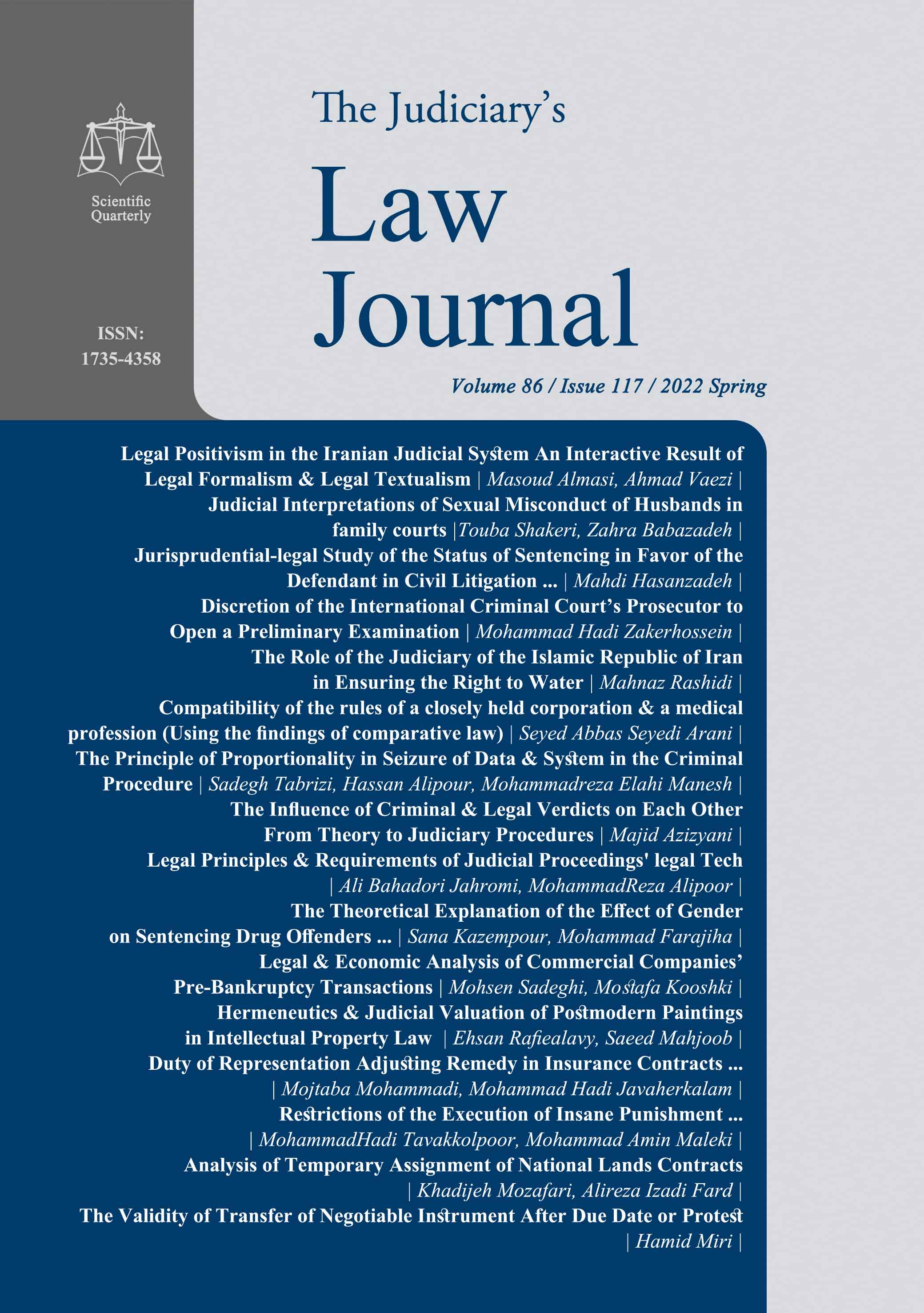Document Type : Research/Original/Regular Article
Authors
1 Assistant Professor, Department of Public Law, Faculty of Law, Tarbiat Modares University, Tehran, Iran
2 Master of Islamic Education and Public Law, Faculty of Islamic Education and Law, Imam Sadegh (AS) University, Tehran, Iran
Abstract
Social behavior as a subject of law is one of the most important issues that has been affected by the emergence of new technologies. In recent years, legal technologies (LegalTech) have been tried to increase public access to justice. These technologies affect three categories of judicial proceedings, private legal services, and government regulatory actions. Develope LegalTechs, like any other legal phenomenon, requires programing in the direction and in accordance with the principles of the legal system. Inattention to the relevance of legal systems governing and the LegalTechs that used in judicial proceedings, causes similar experience for LegalTechs, like imported technologies that not only did not facilitate and strengthen the quality of previous practices, but worse and irreparable problems. Have also been accompanied. In this article , we have tried to achieve the requirements of the legal system of the Islamic Republic of Iran on the judicial proceedings' LegalTechs by examining the principles of fair trial by analytical-descriptive method.
Keywords
Main Subjects
فارسی
- آشوری، محمد (1376)، اصل برائت و آثار آن در امور کیفری (مطالعه تطبیقی)، مجموعه مقالات عدالت کیفری، تهران: انتشارات گنج دانش.
- اسدی، داوود (1388)، «اصول حاکم بر عدالت کیفری در حقوق موضوعه ایران»، فصلنامه نظم و امنیت اجتماعی، سال دوم، شمارۀ 4.
- اسمعیلی، اکبر و بابک پورقهرمانی (1398)، «چالشهای فراروی دادرسی الکترونیک در ایران»، دیدگاه های حقوق قضایی، دورۀ 24، شمارۀ 87.
- امامی، محمد و سیدنصرالله موسوی (1383)، «مبانی نظری مراجع شبه قضائی و جایگاه آن ها در حقوق ایران»، مجله علوم اجتماعی و انسانی دانشگاه شیراز، دورۀ 21، شمارۀ 41.
- امیری، علی، جواد طهماسبی و بتول پاکزاد (1400)، «کاربرد مدیریت ارجاع در تضمین دادرسی بیطرفانۀ کیفری»، مجله حقوقی دادگستری، دوره 85، شمارۀ 114.
- باربریس، ژانوس، داگلاس دبلیو آرنر و راسپی باکلی (1399)، کتابِ رگتک: مرجع سرمایهگذاران، کارآفرینان و رویاپردازان در زمینه رگتک، علیرضا کاظمینیا، شراره شبلالحکما و محمد رهبان، تهران: انتشارات راه پرداخت.
- بهادری جهرمی، علی و سیده لطیفه حسینی (1393)، «اصول دادرسی عادلانه در پرتو اندیشه اسلامی و نظام حقوق داخلی»، مطالعات حقوق بشر اسلامی، سال سوم، شمارۀ 7.
- حبیبی درگاهی، بهنام (1399)، «مفهوم اصل دسترسی ارزان به دادگستری و جلوههای آن»، مجله حقوقی دادگستری، دورۀ 84، شمارۀ 109.
- رستگار، عصمت (1399)، «چالش های حقوق شهروندی در دادرسی الکترونیک با نگاهی به جایگاه آن در فقه شیعه»، مطالعات تطبیقی حقوق شهروندی، دورۀ یکم، شمارۀ 1.
- رستمی، ولی و مسلم آقایی طوق و حسن لطفی (1388)، دادرسی عادلانه در مراجع اختصاصی اداری ایران، تهران: گرایش.
- سرخوشمنجقتپه، بهنام و هما داودیگرمارودی (1398)، «بررسی فقهی تشکیل جلسهی دادرسی به شیوهی الکترونیکی»، تحقیقات حقوقی تطبیقی ایران و بین الملل، سال دوازدهم، شمارۀ 43.
- شوآب، کلوس (1396)، انقلاب صنعتی چهارم، ایرج نبیپور، بوشهر: انتشارات دانشگاه علوم پزشکی و خدمات بهداشتی درمانی بوشهر.
- صابر، محمود (1388)، «معیارها و تضمینهای دادرسی عادلانه در مرحله تحقیقات مقدماتی»، پژوهشهای حقوق تطبیقی، پیاپی 63، شمارۀ 13.
- عالیپناه، علیرضا و عزیزاله فضلی (1391)، «چیستی حقوق و چگونگی ارتباط آن با فرهنگ»، پژوهشنامه حقوق اسلامی، سال 13، شمارۀ 35.
- عباسی، بیژن (1390)، حقوق بشر و آزادیهای بنیادین، تهران: نشر دادگستر.
- مرادی، قاسم (1397)، «اصول حاکم بر روند دادرسی عادلانه»، جستارهای حقوق عمومی، سال 2، شمارۀ 4.
- مؤذنزادگان، حسنعلی و حسن غلامعلیزاده (1388)، «بررسی تحلیلی جایگاه تفسیر شک به نفع متهم در حقوق کیفری»، پژوهشنامه حقوق اسلامی، دورۀ 10، شمارۀ 30.
- هاشمی، سید محمد (1384)، حقوق بشر و آزادیهای اساسی، تهران: نشر میزان.
انگلیسی
- Bues M-M, Matthaei E (2017), LegalTech on the rise: technology changes legal work behaviors, but does not replace its profession. Jacob K, Schindler D, Strathausen R (eds) Liquid legal: transforming legal into a business savvy, information enabled and performance driven industry. Cham: Springer.
- Corrales, Marcelo; Fenwick, Mark; Haapio, Helena (2019), Legal Tech, Smart Contracts and Blockchain. Singapore: Springer.
- Chishti, Susanne; Bhatti, Sophia Adams; Datoo, Akber; Indjic, Drago (2020), The legaltech book. The legal technology handbook for investors, entrepreneurs and fintech visionaries, edited by Sophia Adams Bhatti, Akber Datoo, Drago Indjic; edited-in-chief, Susanne Chishti. 1st, New Jersey: Hoboken.
- Frankenfield, Jake, What You Should Know About RegTech, Investopedia, 27/10/2016, Available at:
- https://www.investopedia.com/terms/r/regtech.asp, (checked on 9/8/2020).
- Pasquale, Frank (2019), “DATA-INFORMED DUTIES IN AI DEVELOPMENT”, Columbia Law Review, 119 (7).
- Reiling, Dory (2009), Technology for justice. How information technology can support judicial reform, AmsterdamL Leiden University Press.
- Synmonides, Janusz (2000), Human Rights: Concept and Standards, UNESCO.

